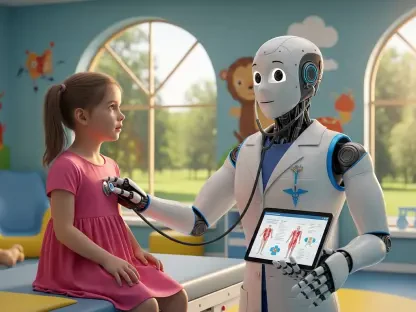The dramatic growth of the health care industry in Arizona, surpassing the national average with an annual growth rate of 2.9%, presents both opportunities and challenges. Although this rapid expansion is a boon for economic development, it is projected that Arizona will face a deficit of 76,000 health care workers by 2033. The urgency to address this looming shortage has never been greater. A multifaceted, collaborative effort is essential to developing a sustainable health care workforce pipeline that not only meets the current demand but also prepares for future needs.
Community-Focused Initiatives
Connect to Work AZ
Jennifer Mellor from the Greater Phoenix Chamber Foundation has highlighted the importance of programs like Connect to Work AZ, which plays a crucial role in connecting underemployed and unemployed individuals with high-demand health care roles. This initiative stands as a pivotal element in fostering economic mobility while addressing the health care workforce shortage. By helping individuals secure stable employment, it offers them an opportunity to contribute meaningfully to the community.
Connect to Work AZ has already had a significant impact by successfully placing over 100 job seekers in various health care positions, including 40 placements at HonorHealth alone. These placements not only alleviate immediate workforce shortages but also provide individuals with career pathways that promise growth and development. The program acts as a bridge, ushering a diverse range of talents into health care careers, which is vital for a system that thrives on a variety of skills and perspectives.
ElevateEdAZ
Another educational initiative making waves is ElevateEdAZ, designed to introduce students to the vast career opportunities within the health care sector. By connecting students with pathways to promising roles, this initiative ensures that the next generation is well-prepared to step into health care positions. ElevateEdAZ employs a comprehensive approach that includes job shadows, internships, and other engagements, all aimed at equipping students with the practical experience and knowledge they need for meaningful careers.
Through these hands-on learning opportunities, students gain invaluable insights into the everyday workings of health care settings, preparing them adequately for the future. By demystifying health care careers and making these roles accessible and attractive, ElevateEdAZ helps in building a robust workforce pipeline. This preparation is crucial for addressing the long-term needs of Arizona’s health care system, ensuring that it remains resilient and capable of providing high-quality care.
Strategic Collaborations
A Unified Health Care Workforce Collaborative
Kara Greene has identified the power of collaboration that extends beyond mere recruitment, emphasizing a health care workforce collaborative assembled by the Greater Phoenix Chamber Foundation. This collaborative unites all major hospital systems in Arizona to tackle pressing workforce challenges collectively. One of the most significant outcomes of this collaboration has been the development of new nursing specialty programs. By aligning educational programs with industry needs, this initiative ensures that nurses are equipped with the specialized skills required in evolving clinical environments.
In addition to curriculum development, the collaborative has spearheaded a joint marketing campaign aimed at attracting out-of-state health care talent to Arizona. This collective effort is instrumental in addressing immediate workforce gaps while also projecting Arizona as a prime destination for health care professionals. By pooling resources and knowledge, the collaborative exemplifies how cooperative strategies can lead to meaningful, industry-wide solutions.
HonorHealth’s Comprehensive Approach
HonorHealth’s century-long partnership with local organizations stands as a testament to the power of coordinated efforts in improving community well-being. Their leadership in workforce development is evident through a range of initiatives, from entry-level recruitment to advanced career pathways. HonorHealth’s efforts to ensure a skilled and diverse future workforce include comprehensive mentorship programs and opportunities for career advancement, making it an attractive employer that invests in its employees’ growth.
One notable aspect of HonorHealth’s approach is its success in placing 40 individuals through internal programs designed for professional development. These programs emphasize the importance of mentorship, continuous learning, and career progression, fostering a culture where employees feel valued and motivated to grow within the organization. By creating such an environment, HonorHealth not only retains talent but also enriches the overall quality of care provided to the community.
Preparing for the Future
Comprehensive Onboarding and Career Growth
Attracting talent is merely the initial step in building a sustainable health care workforce. Long-term success hinges on comprehensive onboarding processes that instill a sense of belonging and commitment among new hires. Organizations must prioritize creating an inclusive culture where employees feel engaged and supported from the very beginning. Effective onboarding is crucial for setting the tone and expectations, helping new employees integrate seamlessly into their roles.
Promoting career growth and further education are equally vital components. Health care professionals must have access to continuous professional development opportunities that enable them to expand their competencies and adapt to industry changes. Encouraging community engagement and professional growth not only serves to retain talent but also elevates the standard of care provided to patients. Programs that support such development initiatives are essential for nurturing a dedicated and skilled workforce.
Addressing Long-Term Needs
The rapid growth of Arizona’s health care industry, which is expanding at an annual rate of 2.9%—higher than the national average—brings various opportunities and challenges. While this growth significantly boosts economic development, projections reveal a looming issue: Arizona is expected to face a shortfall of 76,000 health care workers by 2033. This forecast highlights the urgent need to address the impending workforce shortage.
To combat this, a collaborative, multifaceted approach is essential. Stakeholders from various sectors must work together to create a sustainable health care workforce pipeline that can not only meet present demands but also anticipate and prepare for future needs. This will involve strategic planning, investment in education and training programs, and establishing partnerships between educational institutions, government agencies, and healthcare providers. By adopting a comprehensive strategy, Arizona can ensure it maintains a robust healthcare system capable of supporting its growing population.









